Charles E W Bean, Diaries, AWM38 3DRL 606/245/1 - 1915 - 1925 - Part 3
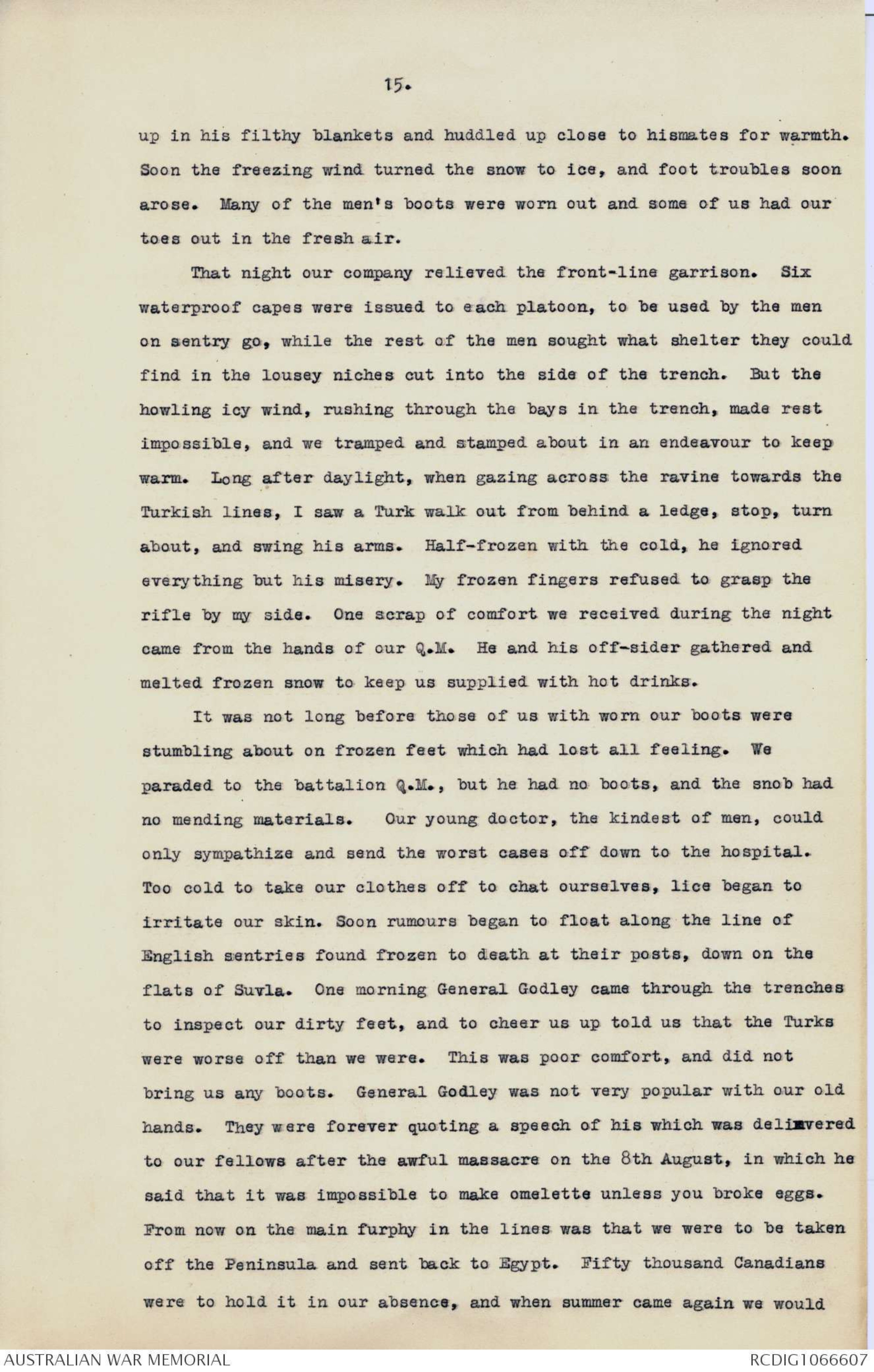
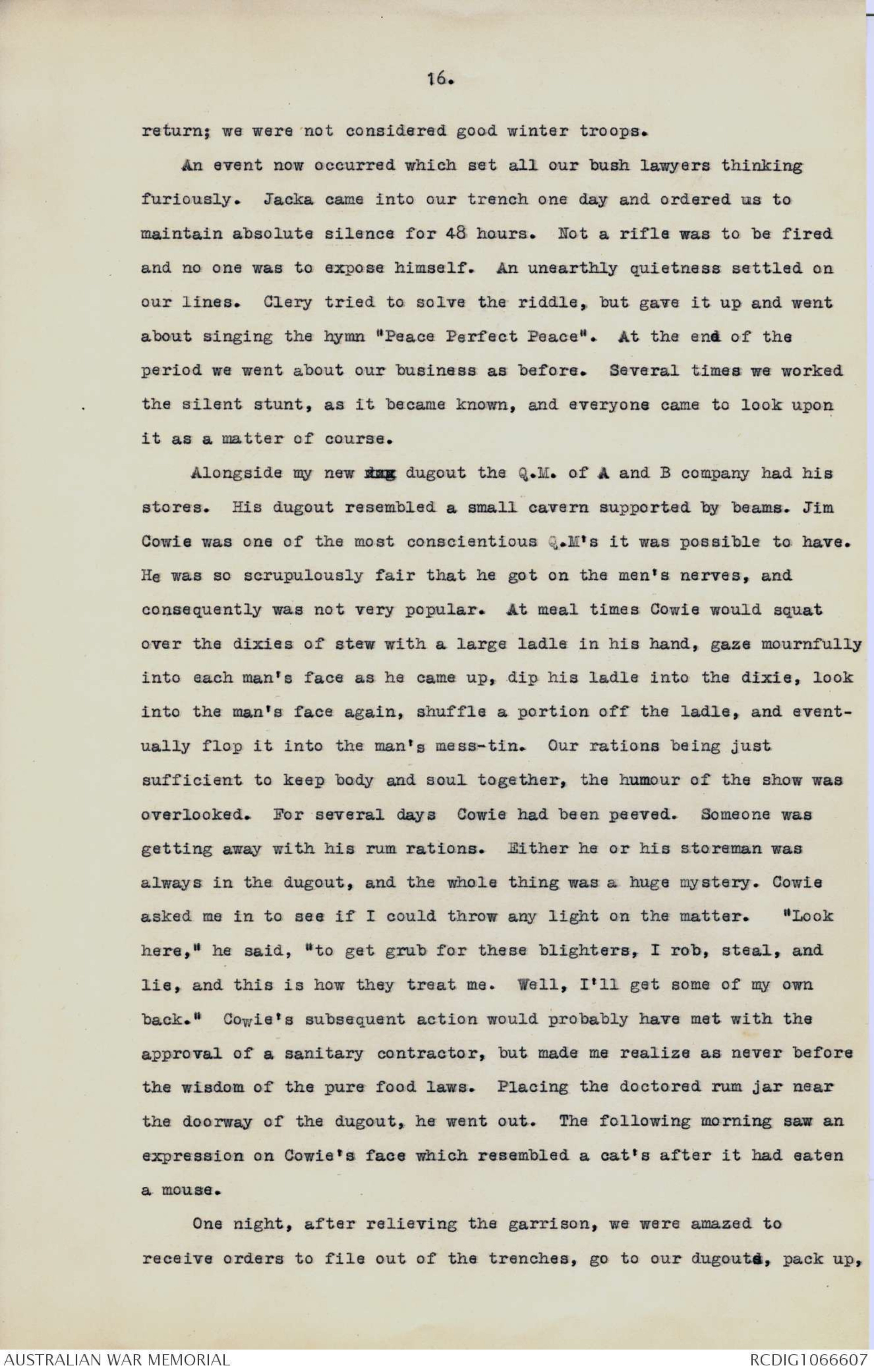
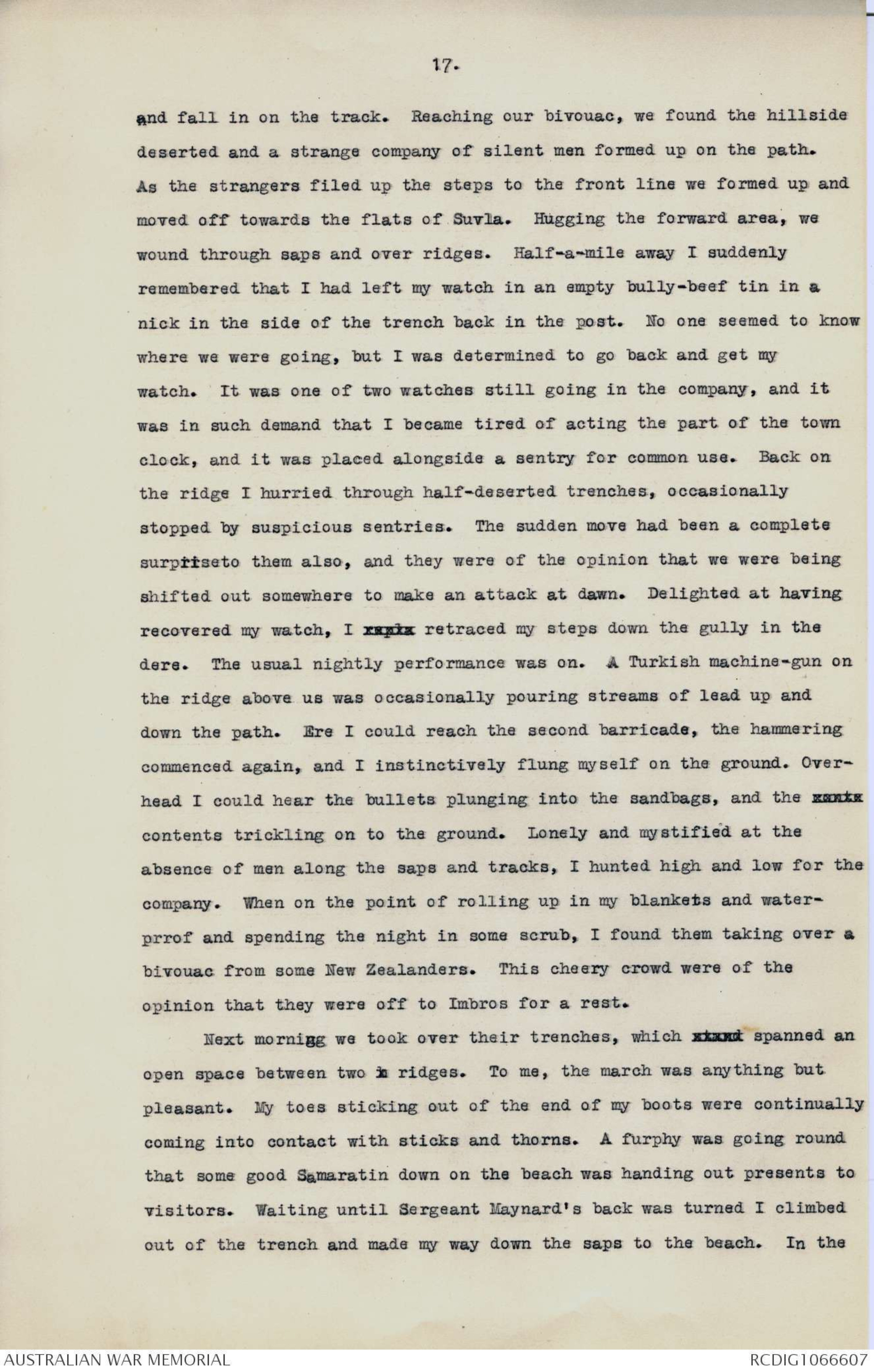
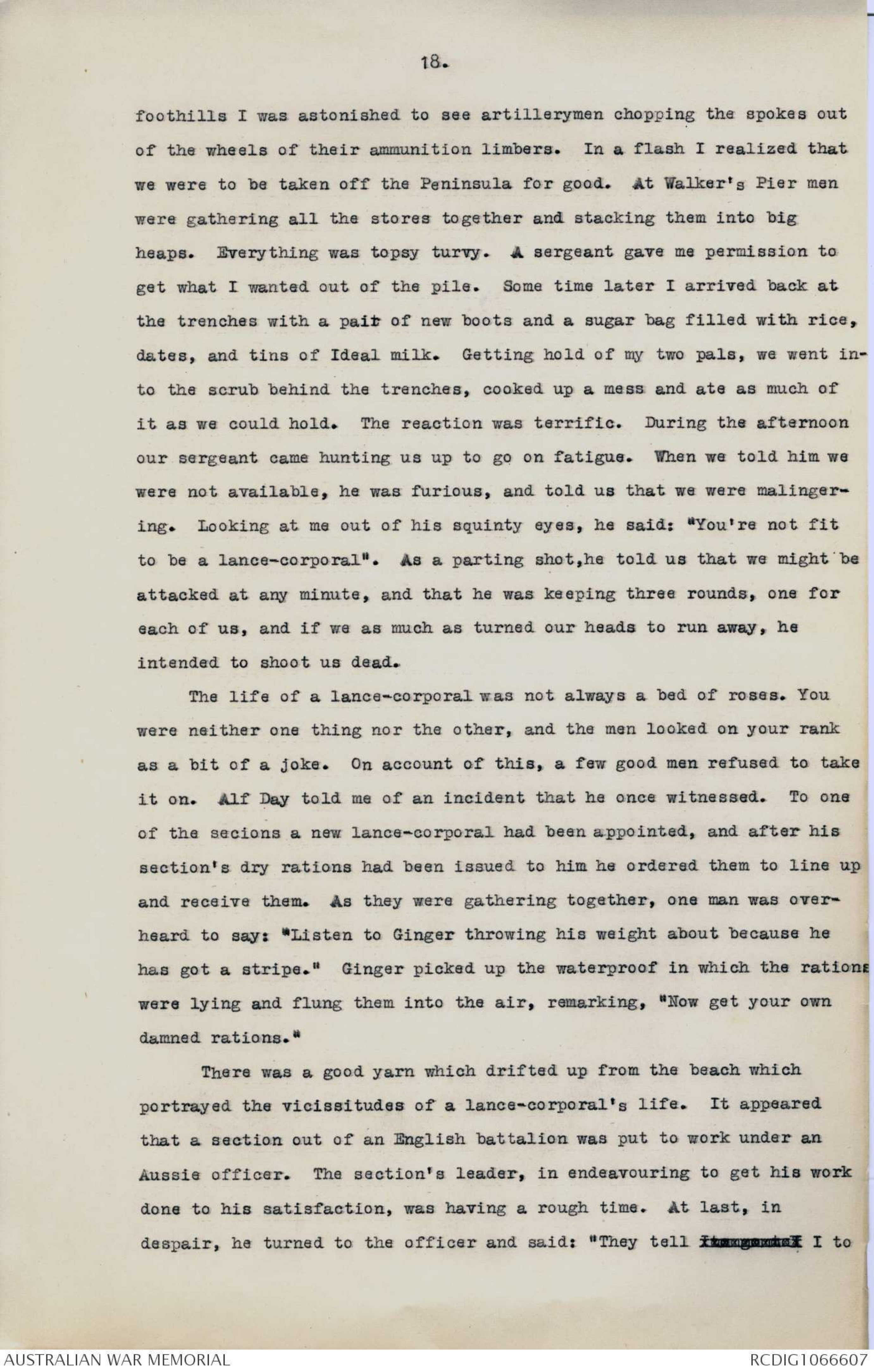
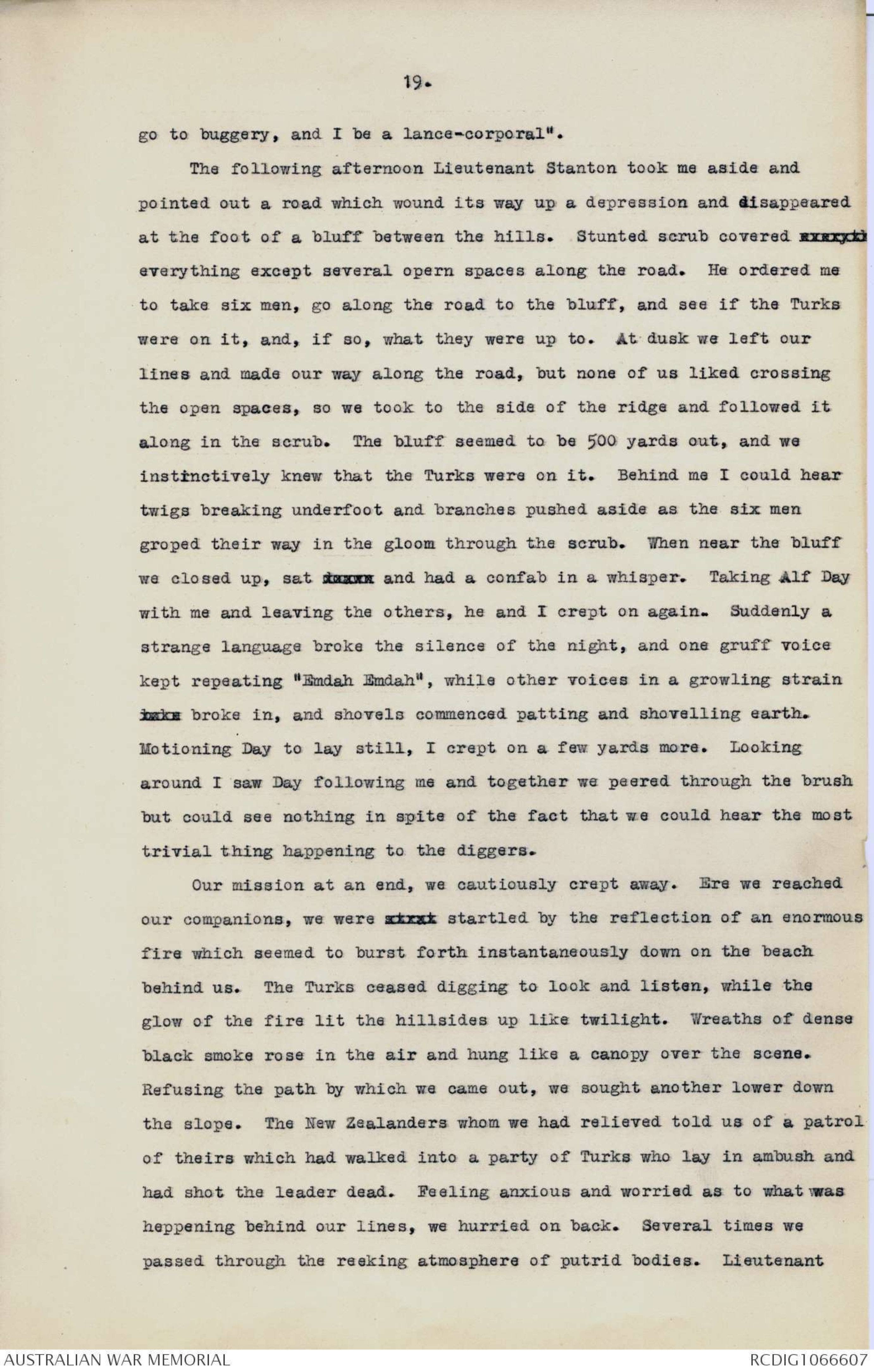
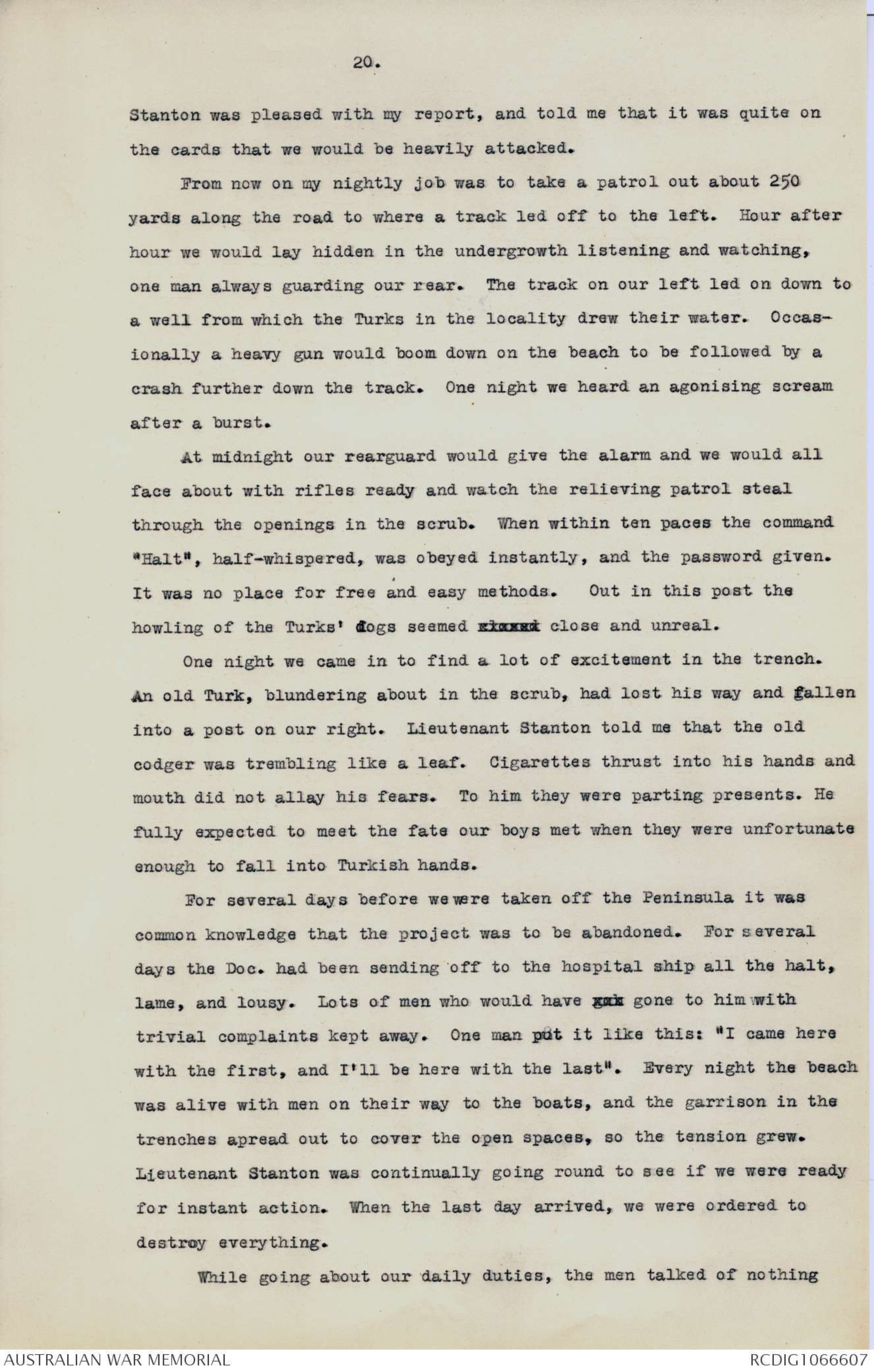
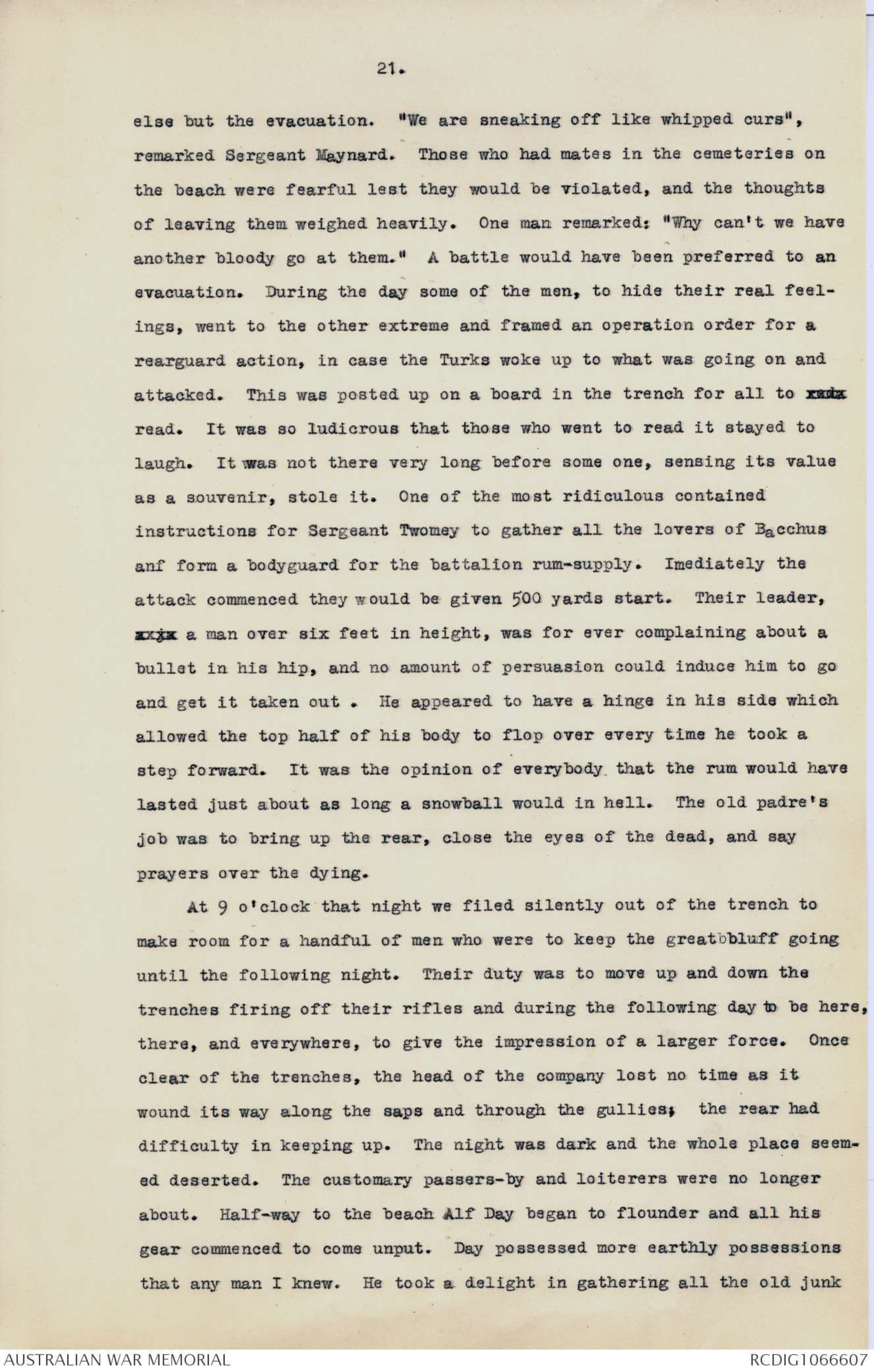
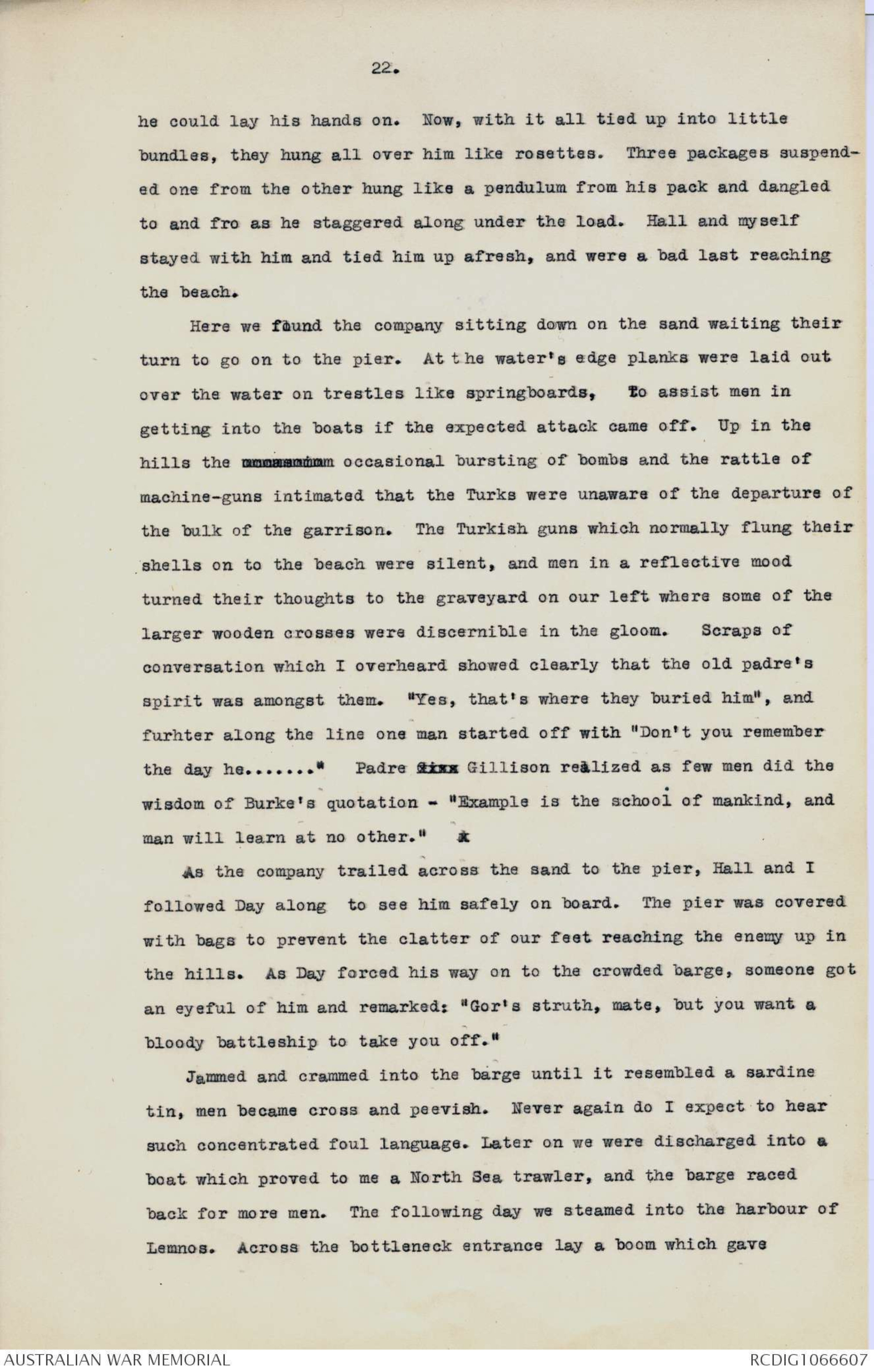
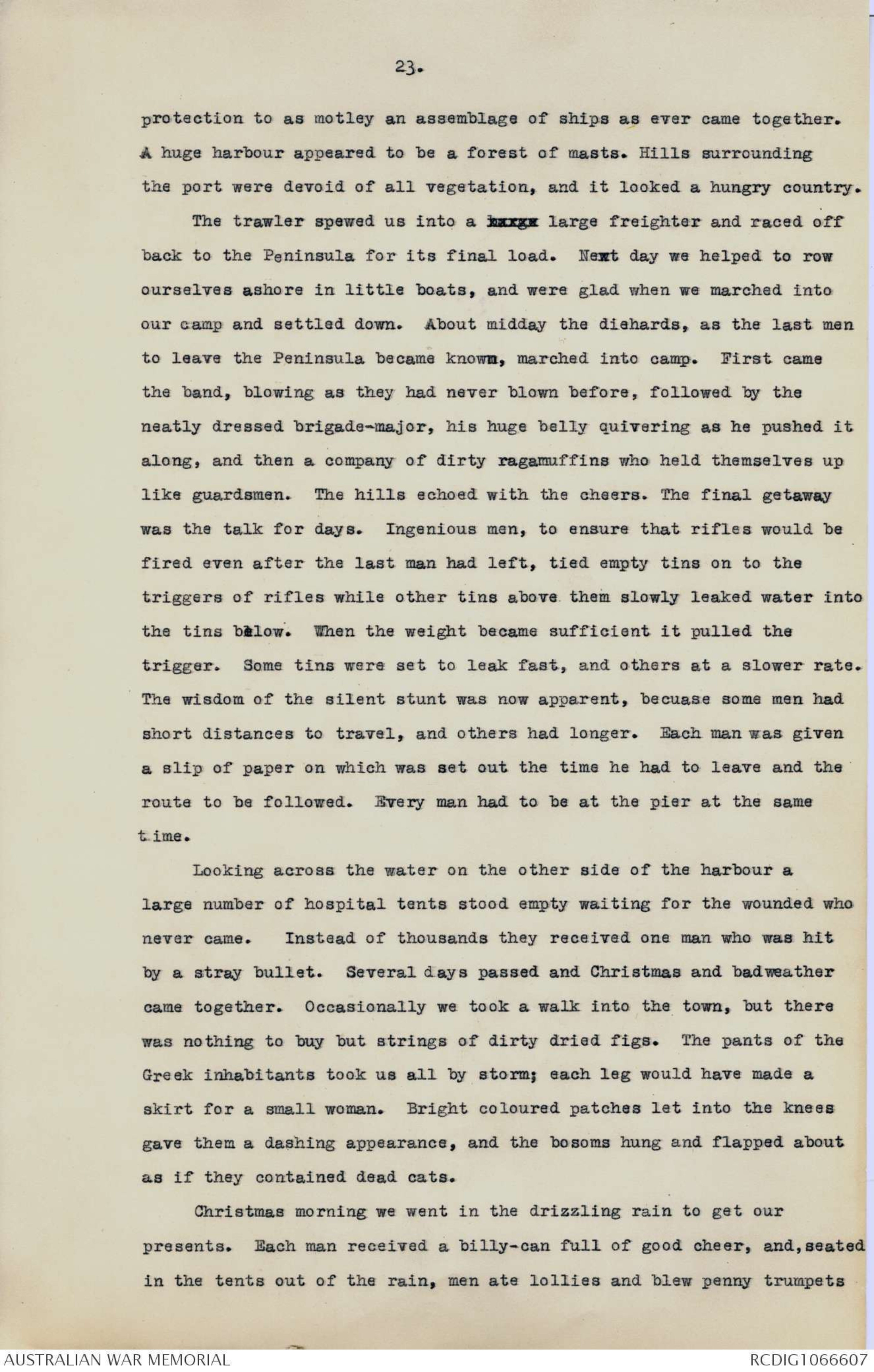
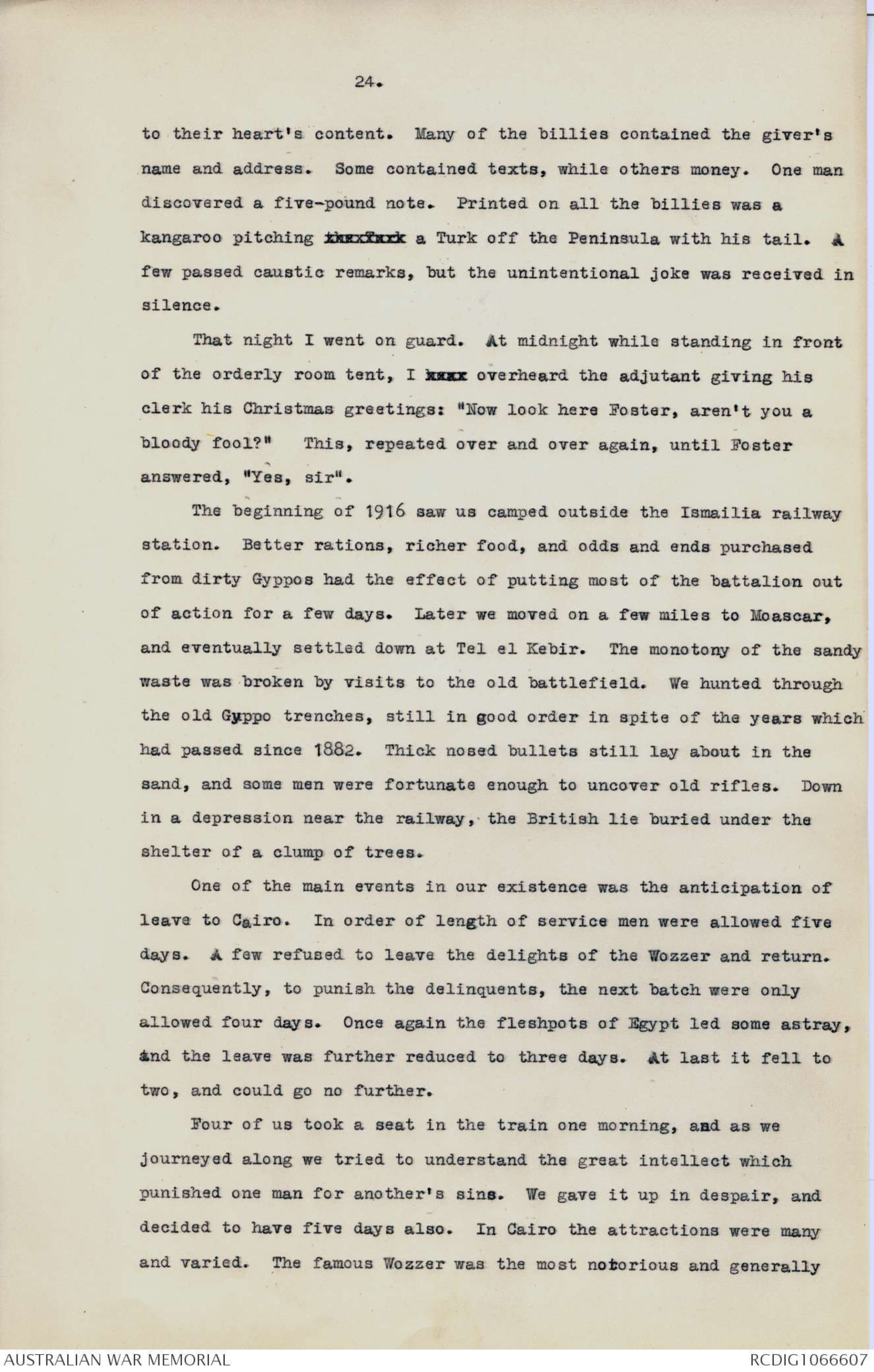
15.
up in his filthy blankets and huddled up close to hismates for warmth.
Soon the freezing wind turned the snow to ice, and foot troubles soon
arose. Many of the men's boots were worn out and some of us had our
toes out in the fresh air.
That night our company relieved the front-line garrison. Six
waterproof capes were issued to each platoon, to be used by the men
on sentry go, while the rest of the men sought what shelter they could
find in the lousey niches cut into the side of the trench. But the
howling icy wind, rushing through the bays in the trench, made rest
impossible, and we tramped and stamped about in an endeavour to keep
warm. Long after daylight, when gazing across the ravine towards the
Turkish lines, I saw a Turk walk out from behind a ledge, stop, turn
about, and swing his arms. Half-frozen with the cold, he ignored
everything but his misery. My frozen fingers refused to grasp the
rifle by my side. One scrap of comfort we received during the night
came from the hands of our Q.M. He and his off-sider gathered and
melted frozen snow to keep us supplied with hot drinks.
It was not long before those of us with worn our boots were
stumbling about on frozen feet which had lost all feeling. We
paraded to the battalion Q.M., but he had no boots, and the snob had
no mending materials. Our young doctor, the kindest of men, could
only sympathize and send the worst cases off down to the hospital.
Too cold to take our clothes off to chat ourselves, lice began to
irritate our skin. Soon rumours began to float along the line of
English sentries found frozen to death at their posts, down on the
flats of Suvla. One morning General Godley came through the trenches
to inspect our dirty feet, and to cheer us up told us that the Turks
were worse off than we were. This was poor comfort, and did not
bring us any boots. General Godley was not very popular with our old
hands. They were forever quoting a speech of his which was delimvered
to our fellows after the awful massacre on the 8th August, in which he
said that it was impossible to make omelette unless you broke eggs.
From now on the main furphy in the lines was that we were to be taken
off the Peninsula and sent back to Egypt. Fifty thousand Canadians
were to hold it in our absence, and when summer came again we would
16.
return; we were not considered good winter troops.
An event now occurred which set all our bush lawyers thinking
furiously. Jacka came into our trench one day and ordered us to
maintain absolute silence for 48 hours. Not a rifle was to be fired
and no one was to expose himself. An unearthly quietness settled on
our lines. Clery tried to solve the riddle, but gave it up and went
about singing the hymn "Peace Perfect Peace". At the end of the
period we went about our business as before. Several times we worked
the silent stunt, as it became known, and everyone came to look upon
it as a matter of course.
Alongside my new dug dugout the Q.M. of A and B company had his
stores. His dugout resembled a small cavern supported by beams. Jim
Cowie was one of the most conscientious Q.M's it was possible to have.
He was so scrupulously fair that he got on the men's nerves, and
consequently was not very popular. At meal times Cowie would squat
over the dixies of stew with a large ladle in his hand, gaze mournfully
into each man's face as he came up, dip his ladle into the dixie, look
into the man's face again, shuffle a portion off the ladle, and eventually
flop it into the man's mess-tin. Our rations being just
sufficient to keep body and soul together, the humour of the show was
overlooked. For several days Cowie had been peeved. Someone was
getting away with his rum rations. Either he or his storeman was
always in the dugout, and the whole thing was a huge mystery. Cowie
asked me in to see if I could throw any light on the matter. "Look
here," he said, "to get grub for these blighters, I rob, steal, and
lie, and this is how they treat me. Well, I'll get some of my own
back." Cowie's subsequent action would probably have met with the
approval of a sanitary contractor, but made me realize as never before
the wisdom of the pure food laws. Placing the doctored rum jar near
the doorway of the dugout, he went out. The following morning saw an
expression on Cowie's face which resembled a cat's after it had eaten
a mouse.
One night, after relieving the garrison, we were amazed to
receive orders to file out of the trenches, go to our dugouts, pack up,
17
and fall in on the track. Reaching our bivouac, we found the hillside
deserted and a strange company of silent men formed up on the path.
As the strangers filed up the steps to the front line we formed up and
moved off towards the flats of Suvla. Hugging the forward area, we
wound through saps and over ridges. Half-a-mile away I suddenly
remembered that I had left my watch in an empty bully-beef tin in a
nick in the side of the trench back in the post. No one seemed to know
where we were going, but I was determined to go back and get my
watch. It was one of two watches still going in the company, and it
was in such demand that I became tired of acting the part of the town
clock, and it was placed alongside a sentry for common use. Back on
the ridge I hurried through half-deserted trenches, occasionally
stopped by suspicious sentries. The sudden move had been a complete
surpriseto them also, and they were of the opinion that we were being
shifted out somewhere to make an attack at dawn. Delighted at having
recovered my watch, I replac retraced my steps down the gully in the
dere. The usual nightly performance was on. A Turkish machine-gun on
the ridge above us was occasionally pouring streams of lead up and
down the path. Ere I could reach the second barricade, the hammering
commenced again, and I instinctively flung myself on the ground. Overhead
I could hear the bullets plunging into the sandbags, and the conte
contents trickling on to the ground. Lonely and mystified at the
absence of men along the saps and tracks, I hunted high and low for the
company. When on the point of rolling up in my blankets and water-prrof
and spending the night in some scrub, I found them taking over a
bivouac from some New Zealanders. This cheery crowd were of the
opinion that they were off to Imbros for a rest.
Next morning we took over their trenches, which stand spanned an
open space between two x ridges. To me, the march was anything but
pleasant. My toes sticking out of the end of my boots were continually
coming into contact with sticks and thorns. A furphy was going round
that some good Samaratin down on the beach was handing out presents to
visitors. Waiting until Sergeant Maynard's back was turned I climbed
out of the trench and made my way down the saps to the beach. In the
18.
foothills I was astonished to see artillerymen chopping the spokes out
of the wheels of their ammunition limbers. In a flash I realized that
we were to be taken off the Peninsula for good. At Walker's Pier men
were gathering all the stores together and stacking them into big
heaps. Everything was topsy turvy. A sergeant gave me permission to
get what I wanted out of the pile. Some time later I arrived back at
the trenches with a pair of new boots and a sugar bag filled with rice,
dates, and tins of Ideal milk. Getting hold of my two pals, we went into
the scrub behind the trenches, cooked up a mess and ate as much of
it as we could hold. The reaction was terrific. During the afternoon
our sergeant came hunting us up to go on fatigue. When we told him we
were not available, he was furious, and told us that we were malingering.
Looking at me out of his squinty eyes, he said: "You're not fit
to be a lance-corporal". As a parting shot, he told us that we might be
attacked at any minute, and that he was keeping three rounds, one for
each of us, and if we as much as turned our heads to run away, he
intended to shoot us dead.
The life of a lance-corporal was not always a bed of roses. You
were neither one thing nor the other, and the men looked on your rank
as a bit of a joke. On account of this, a few good men refused to take
it on. Alf Day told me of an incident that he once witnessed. To one
of the secions a new lance-corporal had been appointed, and after his
section's dry rations had been issued to him he ordered them to line up
and receive them. As they were gathering together, one man was overheard
to say: "Listen to Ginger throwing his weight about because he
has got a stripe." Ginger picked up the waterproof in which the rations
were lying and flung them into the air, remarking, "Now get your own
damned rations."
There was a good yarn which drifted up from the beach which
portrayed the vicissitudes of a lance-corporal's life. It appeared
that a section out of an English battalion was put to work under an
Aussie officer. The section's leader, in endeavouring to get his work
done to his satisfaction, was having a rough time. At last, in
despair, he turned to the officer and said: "They tell Ito gxxxxxX I to
19.
go to buggery, and I be a lance-corporal".
The following afternoon Lieutenant Stanton took me aside and
pointed out a road which wound its way up a depression and disappeared
at the foot of a bluff between the hills. Stunted scrub covered everyth
everything except several opern spaces along the road. He ordered me
to take six men, go along the road to the bluff, and see if the Turks
were on it, and, if so, what they were up to. At dusk we left our
lines and made our way along the road, but none of us liked crossing
the open spaces, so we took to the side of the ridge and followed it
along in the scrub. The bluff seemed to be 500 yards out, and we
instinctively knew that the Turks were on it. Behind me I could hear
twigs breaking underfoot and branches pushed aside as the six men
groped their way in the gloom through the scrub. When near the bluff
wa closed up, sat xxxxx and had a confab in a whisper. Taking Alf Day
with me and leaving the others, he and I crept on again. Suddenly a
strange language broke the silence of the night, and one gruff voice
kept repeating "Emdah Emdah", while other voices in a growling strainbake broke in, and shovels commenced patting and shovelling earth.
Motioning Day to lay still, I crept on a feu yards more. Looking
around I saw Day following me and together we peered through the brush
but could see nothing in spite of the fact that we could hear the most
trivial thing happening to the diggers.
Our mission at an end, we cautiously crept away. Ere we reached
our companions, we were strat startled by the reflection of an enormous
fire which seemed to burst forth instantaneously down on the beach
behind us. The Turks ceased digging to look and listen, while the
glow of the fire lit the hillsides up like twilight. Wreaths of dense
black smoke rose in the air and hung like a canopy over the scene.
Refusing the path by which we came out, we sought another lower down
the slope. The New Zealanders whom we had relieved told us of a patrol
of theirs which had walked into a party of Turks who lay in ambush and
had shot the leader dead. Feeling anxious and worried as to what was
heppening behind our lines, we hurried on back. Several times we
passed through the reeking atmosphere of putrid bodies. Lieutenant
20.
Stanton was pleased with my report, and told me that it was quite on
the cards that we would be heavily attacked.
From now on my nightly job was to take a patrol out about 250
yards along the road to where a track led off to the left. Hour after
hour we would lay hidden in the undergrowth listening and watching,
one man always guarding our rear. The track on our left led on down to
a well from which the Turks in the locality drew their water. Occasionally
a heavy gun would boom down on the beach to be followed by a
crash further down the track. One night we heard an agonising scream
after a burst.
At midnight our rearguard would give the alarm and we would all
face about with rifles ready and watch the relieving patrol steal
through the openings in the scrub. When within ten paces the command
"Halt", half-whispered, was obeyed instantly, and the password given.
It was no place for free and easy methods. Out in this post the
howling of the Turks' dogs seemed closed close and unreal.
One night we came in to find a lot of excitement in the trench.
An old Turk, blundering about in the scrub, had lost his way and fallen
into a post on our right. Lieutenant Stanton told me that the old
codger was trembling like a leaf. Cigarettes thrust into his hands and
mouth did not allay his fears. To him they were parting presents. He
fully expected to meet the fate our boys met when they were unfortunate
enough to fall into Turkish hands.
For several days before we were taken off the Peninsula it was
common knowledge that the project was to be abandoned. For several
days the Doc. had been sending off to the hospital ship all the halt,
lame, and lousy. Lots of men who would have xxx gone to him with
trivial complaints kept away. One man put it like this: "I came here
with the first, and I'll be here with the last". Every night the beach
was alive with men on their way to the boats, and the garrison in the
trenches apread out to cover the open spaces, so the tension grew.
Lieutenant Stanton was continually going round to see if we were ready
for instant action. When the last day arrived, we were ordered to
destroy everything.
While going about our daily duties, the men talked of nothing
21.
else but the evacuation. "We are sneaking off like whipped curs"
remarked Sergeant Maynard. Those who had mates in the cemeteries on
the beach were fearful lest they would be violated, and the thoughts
of leaving them weighed heavily. One man remarked: "Why can't we have
another bloody go at them." A battle would have been preferred to an
evacuation. During the day some of the men, to hide their real feelings,
went to the other extreme and framed an operation order for a
rearguard action, in case the Turks woke up to what was going on and
attacked. This was posted up on a board in the trench for all to xxxx
read. It was so ludicrous that those who went to read it stayed to
laugh. It was not there very long before some one, sensing its value
as a souvenir, stole it. One of the most ridiculous contained
instructions for Sergeant Twomey to gather all the lovers of Bacchus
anf form a bodyguard for the battalion rum-supply. Imediately the
attack commenced they would be given 500 yards start. Their leader,xxxx a man over six feet in height, was for ever complaining about a
bullet in his hip, and no amount of persuasion could induce him to go
and get it taken out. He appeared to have a hinge in his side which
allowed the top half of his body to flop over every time he took a
step forward. It was the opinion of everybody that the rum would have
lasted just about as long a snowball would in hell. The old padre's
job was to bring up the rear, close the eyes of the dead, and say
prayers over the dying.
At 9 o'clock that night we filed silently out of the trench to
make room for a handful of men who were to keep the greatbbluff going
until the following night. Their duty was to move up and down the
trenches firing off their rifles and during the following day to be here,
there, and everywhere, to give the impression of a larger force. Once
clear of the trenches, the head of the company lost no time as it
wound its way along the saps and through the gullies; the rear had
difficulty in keeping up. The night was dark and the whole place seemed
deserted. The customary passers-by and loiterers were no longer
about. Half-way to the beach Alf Day began to flounder and all his
gear commenced to come unput. Day possessed more earthly possessions
that any man I knew. He took a delight in gathering all the old junk
22.
he could lay his hands on. Now, with it all tied up into little
bundles, they hung all over him like rosettes. Three packages suspended
one from the other hung like a pendulum from his pack and dangled
to and fro as he staggered along under the load. Hall and myself
stayed with him and tied him up afresh, and were a bad last reaching
the beach.
Here we found the company sitting down on the sand waiting their
turn to go on to the pier. At the water's edge planks were laid out
over the water on trestles like springboards, To assist men in
getting into the boats if the expected attack came off. Up in the
hills the xxxxxxxxxxm occasional bursting of bombs and the rattle of
machine-guns intimated that the Turks were unaware of the departure of
the bulk of the garrison. The Turkish guns which normally flung their
shells on to the beach were silent, and men in a reflective mood
turned their thoughts to the graveyard on our left where some of the
larger wooden crosses were discernible in the gloom. Scraps of
conversation which I overheard showed clearly that the old padre's
spirit was amongst them. "Yes, that's where they buried him", and
furhter along the line one man started off with "Don't you remember
the day he......." Padre Gixx Gillison realized as few men did the
wisdom of Burke's quotation - "Example is the school of mankind, and
man will learn at no other." x
As the company trailed across the sand to the pier, Hall and I
followed Day along to see him safely on board. The pier was covered
with bags to prevent the clatter of our feet reaching the enemy up in
the hills. As Day forced his way on to the crowded barge, someone got
an eyeful of him and remarked: "Gor's struth, mate, but you want a
bloody battleship to take you off."
Jammed and crammed into the barge until it resembled a sardine
tin, men became cross and peevish. Never again do I expect to hear
such concentrated foul language. Later on we were discharged into a
boat which proved to me a North Sea trawler, and the barge raced
back for more men. The following day we steamed into the harbour of
Lemnos. Across the bottleneck entrance lay a boom which gave
23.
protection to as motley an assemblage of ships as ever came together.
A huge harbour appeared to be a forest of masts. Hills surrounding
the port were devoid of all vegetation, and it looked a hungry country.
The trawler spewed us into a barge large freighter and raced off
back to the Peninsula for its final load. Next day we helped to row
ourselves ashore in little boats, and were glad when we marched into
our camp and settled down. About midday the diehards, as the last men
to leave the Peninsula became known, marched into camp. First came
the band, blowing as they had never blown before, followed by the
neatly dressed brigade-major, his huge belly quivering as he pushed it
along, and then a company of dirty ragamuffins who held themselves up
like guardsmen. The hills echoed with the cheers. The final getaway
was the talk for days. Ingenious men, to ensure that rifles would be
fired even after the last man had left, tied empty tins on to the
triggers of rifles while other tins above them slowly leaked water into
the tins below. When the weight became sufficient it pulled the
trigger. Some tins were set to leak fast, and others at a slower rate.
The wisdom of the silent stunt was now apparent, becuase some men had
short distances to travel, and others had longer. Each man was given
a slip of paper on which was set out the time he had to leave and the
route to be followed. Every man had to be at the pier at the same
time.
Looking across the water on the other side of the harbour a
large number of hospital tents stood empty waiting for the wounded who
never came. Instead of thousands they received one man who was hit
by a stray bullet. Several days passed and Christmas and badweather
came together. Occasionally we took a walk into the town, but there
was nothing to buy but strings of dirty dried figs. The pants of the
Greek inhabitants took us all by storm; each leg would have made a
skirt for a small woman. Bright coloured patches let into the knees
gave them a dashing appearance, and the bosoms hung and flapped about
as if they contained dead cats.
Christmas morning we went in the drizzling rain to get our
presents. Each man received a billy-can full of good cheer, and, seated
in the tents out of the rain, men ate lollies and blew penny trumpets
24.
to their heart's content. Many of the billies contained the giver's
name and address. Some contained texts, while others money. One man
discovered a five-pound note. Printed on all the billies was a
kangaroo pitching the Turk a Turk off the Peninsula with his tail. A
few passed caustic remarks, but the unintentional joke was received in
silence.
That night I went on guard. At midnight while standing in front
of the orderly room tent, I xxxx overheard the adjutant giving his
clerk his Christmas greetings: "Now look here Foster, aren't you a
bloody fool?" This, repeated over and over again, until Foster
answered, "Yes, sir"
The beginning of 1916 saw us camped outside the Ismailia railway
station. Better rations, richer food, and odds and ends purchased
from dirty Gyppos had the effect of putting most of the battalion out
of action for a few days. Later we moved on a few miles to Moascar,
and eventually settled down at Tel el Kebir. The monotony of the sandy
waste was broken by visits to the old battlefield. We hunted through
the old Gyppo trenches, still in good order in spite of the years which
had passed since 1882. Thick nosed bullets still lay about in the
sand, and some men were fortunate enough to uncover old rifles. Down
in a depression near the railway, the British lie buried under the
shelter of a clump of trees.
One of the main events in our existence was the anticipation of
leave to Cairo. In order of length of service men were allowed five
days. A few refused to leave the delights of the Wozzer and return.
Consequently, to punish the delinquents, the next batch were only
allowed four days. Once again the fleshpots of Egypt led some astray,
and the leave was further reduced to three days. At last it fell to
two, and could go no further.
Four of us took a seat in the train one morning, and as we
journeyed along we tried to understand the great intellect which
punished one man for another's sins. We gave it up in despair, and
decided to have five days also. In Cairo the attractions were many
and varied. The famous Wozzer was the most notorious and generally
 Sandy Mudie
Sandy MudieThis transcription item is now locked to you for editing. To release the lock either Save your changes or Cancel.
This lock will be automatically released after 60 minutes of inactivity.